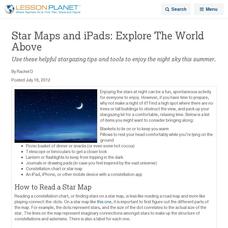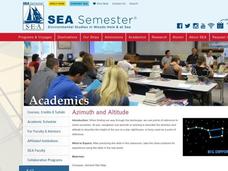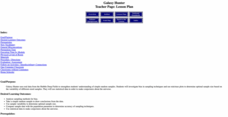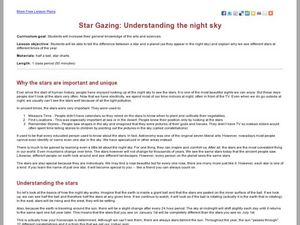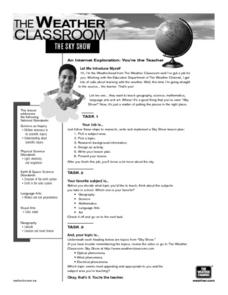Space Awareness
Make a Star Lantern
Go star-gazing with young learners! They study the history, origins, and patterns of constellations in an activity that explores the starry night sky.
Curated OER
Star Maps and iPads: Explore The World Above
Use these helpful stargazing tips and tools to enjoy the night sky this summer.
Curated OER
Lights in the Night Sky
Students read about and explore solar winds and spectacular auroras, specifically the Aurora Borealis, also known as the Northern Lights.
Curated OER
Exploring Mars
Students, working in small groups construct scale models of the planets and solar system. They examine images of Mars and discuss what might have caused the features. They record facts about their planetary research in their journals and...
Curated OER
Observing the Sky
Middle schoolers explore astronomy. In this astronomy instructional activity, students discuss the history of the movement of celestial bodies and then communicate with other middle schoolers regarding the movements that they observe in...
Curated OER
There Are So Many Stars
Students explore the night sky. In this astronomy lesson, students discover a song about the stars in the sky and participate in a flannel board activity pertaining to the song.
Curated OER
Sky 2: Shadows
Students explore space science by participating in a shadow experiment. In this sky observation lesson, students identify how the sun creates different sized shadows by moving across the horizon. Students utilize yard sticks, markers,...
Curated OER
Sky Watchers: Ancient Astronomers
Students close their eyes and picture the sky. They are asked to brainstorm things they may see in the course of a night and day, such as the movement of the sun, moon, and stars. Students work in groups to coduct their research. They...
Curated OER
Azimuth and Altitude
Learners use a compass and their hands to find positions of stars and planets in the night sky or of the sun during the day.
Curated OER
Galaxy Hunter - A Cosmic Photo Safari
Space science stars journey through our night sky and take virtual photos of galaxies to investigate simple random samples. Higher math is used to analyze the data collected. Copy the evaluation/assessment questions onto a handout...
Laboratory for Atmospheric and Space Physics
Goldilocks and the Three Planets
Venus is the second brightest object in the night sky after the moon. Here is an interesting lesson that explores three planets — Venus, Earth, and Mars — specifically their surfaces and atmospheres. Through an analysis of their spectra,...
Curated OER
Small Angle Calculations
Students work with circles, angles and estimating angles in the night sky. In this circles and angles instructional activity, students practice measuring a degree using the circumference of a circle and apply the degree to determine a...
Curated OER
Ranger Rick's Observing Night Lights
In this Ranger Rick's observing night lights worksheet, students observe and record the lights in their neighborhood at night and the effect on the environment.
Curated OER
Zodiac Constellations
In this space science worksheet, students learn to identify the 12 constellations of the Zodiac. Students read the information and look at the detailed drawings of each constellation and when it is visible in the night sky.
Curated OER
Guided Reading "In the Night Sky"
Learners participate in a variety of reading exercises, such as choral reading and reading response journal, to reinforce concepts about space and nocturnal animals.
Curated OER
Star Gazing: Understanding the night sky
Young scholars observe star charts to understand the difference between a star and a planet. In this star lesson plan, students also explain why we see different stars at different times of the year.
Curated OER
The Sky Show
Young scholars use lecture and research to answer the question: Why is the sky blue? students research a variety of other sky phenomena, chart their observations and participate in experiments.
Curated OER
Day and Night
Students using experiments try to demonstrate how observations can be affected by the cycles of night and day.
Curated OER
The Starry Night
Second graders fingerpaint their own interpretations of Vincent Van Gogh's Starry Night.
Houghton Mifflin Harcourt
Nature Walk: English Language Development Lessons (Theme 2)
Walking in nature is the theme of a unit designed to support English language development lessons. Scholars look, write, speak, and move to explore topics such as camping, woodland animals, instruments,...
Toll Middle School
Create Your Own Constellation Mini-Project
When looking up at the night sky, there are many familiar constellations that most people can identify. However, someone had to point those out and create the related mythology. Put your pupils in the place of the creators and invite...
National Endowment for the Humanities
Galileo: Revealing the Universe
To gain an understanding of the significance of Galileo Galilei's revolutionary ideas, class members watch the short video "Stargazing Before Galileo," and conduct a close reading of Galileo's Sidereal Messsenger. They then...
Curated OER
Have you seen the man on the moon?
Students study about the phases of the moon and create a picture of the night sky. They use Super print or Kid Pix to create the picture. Students also decide if the picture they have chosen is good for seeing moon and stars or not.
Curated OER
Using a Starfinder
In this starfinder worksheet, 5th graders construct a starfinder in order to determine which stars are in the night sky on a given date and time. Students use their starfinder to answer 9 questions about the stars and constellations,...



